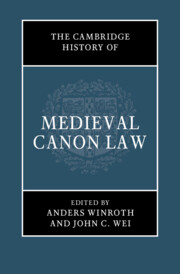Book contents
- The Cambridge History of Medieval Canon Law
- The Cambridge History of Medieval Canon Law
- Copyright page
- Contents
- Figures
- Maps
- Tables
- Contributors
- Acknowledgments
- Abbreviations
- Medieval Canon Law: Introduction
- Part I The History of Medieval Canon Law
- Part II The Sources and Dissemination of Medieval Canon Law
- Part III Doctrine and Society
- Iudicium
- Clerus
- Conubium
- Crimen
- Conclusion
- Bibliography of Primary Sources
- Index
- References
Crimen
from Part III - Doctrine and Society
Published online by Cambridge University Press: 13 January 2022
- The Cambridge History of Medieval Canon Law
- The Cambridge History of Medieval Canon Law
- Copyright page
- Contents
- Figures
- Maps
- Tables
- Contributors
- Acknowledgments
- Abbreviations
- Medieval Canon Law: Introduction
- Part I The History of Medieval Canon Law
- Part II The Sources and Dissemination of Medieval Canon Law
- Part III Doctrine and Society
- Iudicium
- Clerus
- Conubium
- Crimen
- Conclusion
- Bibliography of Primary Sources
- Index
- References
Summary

- Type
- Chapter
- Information
- The Cambridge History of Medieval Canon Law , pp. 493 - 570Publisher: Cambridge University PressPrint publication year: 2022



